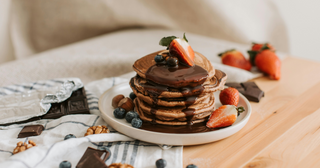Indulging in your favourite dessert at the end of a busy day is a luxury. Many of us intake sweets by calling it a guilty pleasure because we all know that sugar is not our skin’s best friend. But have you ever wondered how it can impact your skin health?
One thing we have to be careful about is a chemical process called glycation. Which is a leading factor of skin ageing.
What is glycation?
It occurs when sugar molecules are in your system. They attach with proteins and create new molecules called AGEs (Advanced Glycation End Products). AGEs cause collagen fibres to become stiff, leading to sagginess, wrinkles, and loss of firmness. It’s been said that glycation is irreversible.
While diets high in sugar can promote glycation, it is a part of the natural process. It can occur even with the smallest amount of sugar. They can increase free radical production, causing further skin ageing, dehydration and lack of radiance. The signs of glycation start showing up around the age of 30 to 35. It’s the age when the built-up of environmental stress, hormonal changes, sun damage and developed AGEs are becoming visible on our skin.
Do we have to cut out all the sugar?
Eliminating sugar from our diets is not necessarily the best option. It’s an essential fuel for our cells, which generates energy in our body. With regular levels of glucose, glycation happens throughout a lifetime. However, your lifestyle choice can easily affect how quickly this process becomes visible on your skin.
Besides, not all sugar is bad sugar. We should look at the one we are adding when cooking to create a sweeter taste. Added sugar is different from natural sugar, which is contained in fruits, vegetables, and milk. This sugar comes with minerals, vitamins, and nutrients. In contrast, the health benefits of added sugar like white sugar, brown sugar, processed sweeteners, honey, and maple syrup are tiny. Watch out for foods like sugary drinks, packaged food, and desserts.
Glycation can’t be stopped, but it can be slowed.
As mentioned above, glycation is a natural process that develops throughout our lifetime. This means it can’t be stopped, but there are ways to slow it down.
Strengthen skin barrier health - Strengthening your skin barrier function by promoting the production of natural antioxidants with vitamins A, B, and C, and Niacinamide can assist with minimising the impact of glycation.
Promote skin nourishment - Optimising skin hydration with hyaluronic acid, ceramides, and fatty acids can reduce the appearance of skin ageing.
To maximise their effects, they should be combined with a healthier lifestyle, such as a diet rich in nutrients, sufficient sleep, and conscious sun protection.
Additionally, green tea has been proven to block glycation while stimulating collagen production. It is recommended that you drink green tea regularly or use products containing green tea to protect your skin.
